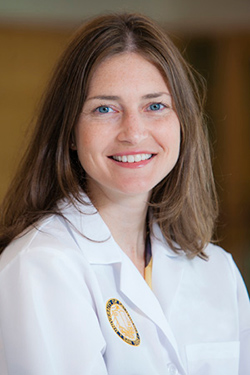Robotic Surgery Program Expands at UC San Diego Health System to Treat Stomach Cancer
By:
- Jackie Carr
Published Date
By:
- Jackie Carr
Share This:
Article Content

Kaitlyn Kelly
Surgeons at UC San Diego Health System have performed the region’s first robotic gastrectomy, a potentially lifesaving procedure to remove a section of the stomach after a diagnosis of gastric cancer. Aided by a da Vinci robot, surgeons remove the diseased tissue, perform a delicate reconstruction and remove local lymph nodes for further testing.
“To treat the gastric cancer, we remove part or all of the stomach with five small incisions,” said Kaitlyn Kelly, MD, surgical oncologist at UC San Diego Health System. “The goal of the robotic approach is to remove the cancer and carefully extract nearby lymph nodes in a highly precise way to achieve a more accurate cancer staging.”
Kelly’s patient, a woman of Korean descent, was diagnosed with stomach cancer after reporting upper abdominal pain to her physician. Korean men and women are five to seven times more likely than Caucasians to develop gastric cancer, which is the fourth most common cancer worldwide.
Also known as an adenocarcinoma, stomach cancer arises from the mucus-producing cells of the stomach lining. Early detection and accurate staging are essential to the patient’s long-term survival. Staging describes the extent or severity of a person’s cancer. Patients with a diagnosis of gastric cancer typically complain of upper stomach pain, persistent and severe heartburn or stomach fullness shortly after eating.
“What is special about the robotic approach is the ability to carefully remove the lymph nodes around large blood vessels without causing damage to the nodes or vessels. This robotic approach can potentially offer a better specimen for pathologists to evaluate,” said Santiago Horgan, MD, chief of minimally invasive surgery at UC San Diego Health System and director of the Center for the Future of Surgery at UC San Diego School of Medicine.
Kelly added that minimally invasive surgery techniques, both robotic and laparoscopic, lead to a speedier recovery, which is important for cancer patients, many of whom require additional chemotherapy after surgery to complete their comprehensive cancer treatment.
Potential risks to this surgery include bleeding, abdominal hernia and leakage of gastric fluids into the abdomen. All potential risks and complications from robotic surgery should be discussed with one’s surgeon.
Kelly recently joined UC San Diego Moores Cancer Center after completing a fellowship in complex surgical oncology at Memorial Sloan-Kettering Cancer Center. Her expertise includes treating benign and malignant gastrointestinal and endocrine diseases. Her clinical interests include the development of oncologically-sound, minimally-invasive approaches to upper gastrointestinal cancers, including laparoscopic and robotic surgical techniques.
UC San Diego Health System offers robotic surgery options for the treatment of cancer, colorectal, heart, head and neck, gastrointestinal, gynecological, bariatric and urological diseases. To learn more about robotic surgery options at UC San Diego Health System, click here.
Share This:
You May Also Like
Stay in the Know
Keep up with all the latest from UC San Diego. Subscribe to the newsletter today.



